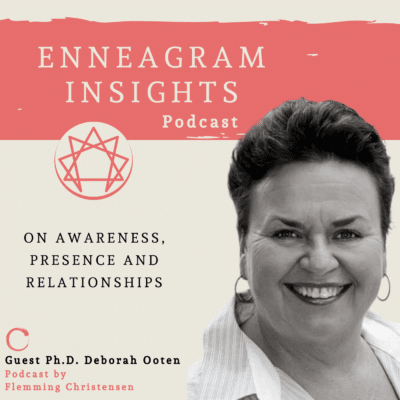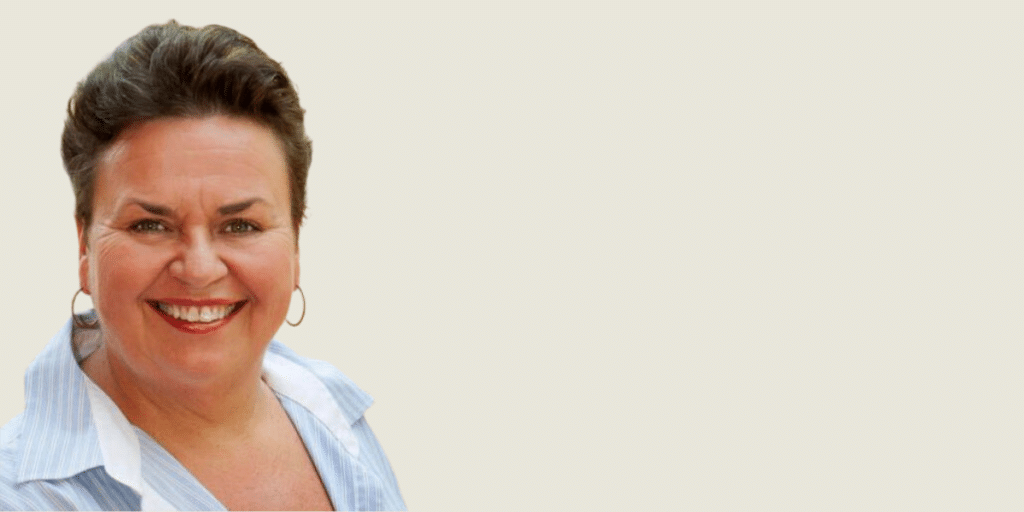Dr. Deborah Ooten: I asked Tato Gomez: “ So what’s your type?” Back then I said, what is your type rather than what’s your fixation. And he said: “One through nine.” And I thought, oh, my God, you are so right. So if we take the law of one, the circle, that says it all. All nine points are on that circle. And so we have access to all nine of the strategies. And at the same time, what we do is we hone one, one specific type. We fixate on that one to get us by because it’s about habits of how we think and feel and behave.
Dr. Deborah Ooten
In this episode of “Ennagram Insights podcast – On Awareness, Presence and Relationships” Flemming Christensen is interviewing Dr. Deborah A. Ooten.
She is the founder and director of the Conscious Living Center.
Dr. Deborah Ooten has a doctorate in clinical psychology and is certified in spiral Dynamics.
She is also a Certified Enneagram Teacher in the Narrative Tradition.
She served on the board of the International Enneagram Association for 6 years as the President.
Flemming Christensen knows her as they have met at global conferences giving talks and their first meeting was in San Fransisco in 2005, where she talked about Spiral Dynamics.
What is the Enneagram according to Dr. Deborah Ooten? What is an Enneagram type? And how do we work with it?
Here are parts of their conversation about the Enneagram traditions and the inner work.
Podcast Interview with Dr. Deborah Ooten by Flemming Christensen
Listen to the whole conversation with Dr. Deborah Ooten here:
What is the Enneagram?
Flemming Christensen: “What is the Enneagram to you? Is it a symbol? Is it a model? Is it a mindset?”
Dr. Deborah Ooten: “The Enneagram that we now use, the Enneagram of personality, is a tool.
It’s a tool that we use to access and deepen our understanding of our consciousness of who we really are in the world.
So it’s more about who we are not.
I call it the Enneagram, the strategy for success on planet Earth. So our type is more about who we are not – rather than who we are. It’s how we get by.
I believe that we’re essence. I believe that we’re consciousness. I believe that we’re so much more. And I think our type limits us a little bit.
So the Enneagram of personality can be misused, as you know. Any system can be.
And I think it’s very helpful in understanding how I think, feel, and behave, and to understand how others think, feel, and behave. That way I don’t get into any trouble with them for the most part. “
We don’t know ourselves
Dr. Deborah Ooten: “I think mostly we don’t know ourselves, unless we’ve done a deep dive.
And so, for me, I think the Enneagram is all about knowing ourselves.
The Enneagram is a tool that helps us get there.
I use the Enneagram to bring awareness.
But if someone doesn’t know themself and take an Enneagram type test, they’re going to misidentify.
They’re going to identify as the culture wishes them to be. And so, that misidentification is usually preference.
They have a preference and the culture has a preference.”
Fourth Way Teachings
Dr. Deborah Ooten: “The most important Enneagram for me, which is the Fourth Way teachings that come out of Gurdjieff’s work.
That’s how I actually got introduced to the Enneagram before the Enneagram of personality came on board, was through the Gurdjieff work.
And so I think that basically is a symbol. It’s a system that helps us to unlock all of the mysteries of the universe.”
Wikipedia: “The Fourth Way teaches that the soul a human individual is born with gets trapped and encapsulated by personality, and stays dormant, leaving one not really conscious, despite believing one is. A person must free the soul by following a teaching which can lead to this aim or “go nowhere” upon death of his body.”
Finding my type
Flemming Christensen: “So let’s say in the Enneagram of personality, when I find my type, what is it that I find?”
Dr. Deborah Ooten: “When I find my type, I find my strategy for navigating the world.
Wherever I am in the world. So, you know, and it’s dependent on where you are, too, in the world.
So when I find my type, the other thing I find is the box that I’ve put myself in. You know, and I see it as 50% nature, 50% nurture, sort of like David Daniels did.
And so for me, it’s about how we were parented. It’s about the energy that we came to the world with.
And so I think it’s a helpful strategy so that we can remind ourselves to come back home.
Come back to the breath, come back to who we truly are, which is, you know, our God self, our higher self, higher mind, higher heart.”
Listen to more highlights from conversation with distinguished Enneagram teachers here
You fixate on a type – you are not a type!
Flemming Christensen: “So if a student of yours would say: “I’m a type one, what are they actually saying?”
Dr. Deborah Ooten: “Well, I actually encourage my students to say: “I fixate at type one, or I fixate at eight”.
I am not an eight.
I fixate at eight.
That’s my coping strategy. Those are my habits of thinking, feeling, and behaving.
So I fixate there. And it’s really hard to stay awake. And so when I fall back to sleep, which is several times every day, those habits are in place to keep me afloat, to keep me moving and going forward.
Otherwise, it’s just the strategy that we use for my way of thinking about it.
A little bit like Oscar Ichazo, he was not talking about types.
He was talking about fixations.”

The law of one
Dr. Deborah Ooten: “I met Tato Gomez. And I said to him, “ So what’s your type?”
Back then I said, what is your type rather than what’s your fixation.
And he said: “One through nine.” And I thought, oh, my God, you are so right.
So if we take the law of one, the circle, that says it all.
All nine points are on that circle. And so we have access to all nine of the strategies for my way of thinking.
And at the same time, what we do is we hone one, one specific type.
We fixate on that one to get us by because it’s about habits of how we think and feel and behave.”
Expectations of the students
Flemming Christensen: “Signing up as a student with you as a teacher, what would you expect from the student, and what could the student expect from you?”
Dr Deborah Ooten: “I would expect loving, kind, compassionate from myself and from them.
I would expect them to be serious.
What I say is, I’m not a one-and-done kind of person. I think if you have a teacher, I don’t really like guru or that kind of stuff.
But I think if you have a teacher, you stay with that teacher until you don’t. And for me, that’s a lifetime. David left us. He died. But I would never leave that.
And I don’t really leave the teaching. I may tweak it because everything evolves. We all have evolved our own version of it.
And so as a teacher, I’m going to explain what I’m seeing. I’m going to ask if they’re dedicated to the change.
And the other thing I say is, hey, once you’ve started the journey, you’re screwed.
There’s no going back. You know, once you start expanding your consciousness, it’s over.
So, you know, you just got to keep moving forward.
And I would invite them to share with me what they needed from me in order to come with an open heart. I’ve had all kinds of different types who have not come with open hearts.
I’ve watched the hearts crack open through their own work and through the teachings.”
We are all teachers
Fleming Christensen: “Have you had to make students leave the class?”
Dr. Deborah Ooten: “I’ve only asked two people in my years and years and years of teaching to leave the class.
Because I see that as a leadership failure on my part.
You know, so if I can’t help that person make the turn, then I’m not going to let them infect the rest of the students.
Because generally, the people who can’t, who don’t want to do the work, I don’t know, they end up showboating in some way, shape or another, you know.
And I believe that when we come together, that’s why I keep my classes as small as possible.
Because when we come together, I may be the primary teacher, but I’m not the only teacher. All of us are teachers.
And so we learn from one another. And so it’s got to be a really safe environment for people to learn in.”
Read more about Dr. Deborah Ootens work here






